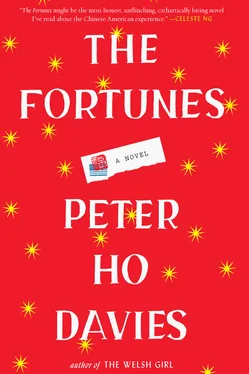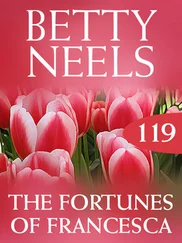“What wrong with my Ingrish?” She pouts, rolls her eyes, but in the absence of any other potential clients, she lets him buy her a drink.
“Napoleon,” she says sulkily, and he thinks for a second she must know their guide, until the bartender brings over a snifter of brandy.
“Same thing?” he asks John.
“Huh? Sure. Why not.” He looks at the glass before him, puzzled. He’s never liked brandy, but he’d been distracted by the waiter’s question, the echo of a terrible joke that someone — an uncle of Nola’s — had told at their wedding reception years earlier. Something about — how did it go? — Paddy O’Keefe’s Chinese Laundry. How’d it get a name like that? Why, I asked the Chinese fellow that ran it the very question. Turns out when he arrived in the country, he was in line behind an Irish fella called Paddy O’Keefe, and when the immigration officer asks the Oriental his name, he says, “Sam Ting.” The point had something to do with John’s last name being Smith.
He shakes his head, watches the girl sip her drink daintily. Would she have dialed his room if his last name were Ling? he wonders. He asks about her, her family, but she’s evasive, reluctant. “Boring,” she says. “You want me ask about your wife?”
He looks at his ring, shakes his head.
“I’m sorry. It’s just I’m a visitor here. I’m curious about your home. Tell me anything. Why is it called the Pearl River? Were there ever pearls in it?”
“No pearls! Just one big round rock in river, so smooth like a pearl. So they named it.” She shrugs. “You want tour guide, I think, not girlfriend. You tourist? Business? What you do here?”
“You first,” he says, and she tells him wearily that she has no family, as if this were obvious. She’s an orphan. “Your turn, mister.”
He takes a mouthful of brandy. His next line comes out as a croak.
“I’m here to adopt an orphan.”
They look at each other and then she laughs. “Too rate!” (He’s almost sure she’s exaggerating her accent.)
He wants to know about her orphanage, but she doesn’t want to talk about it. She wants to know about America. Where he lives. What he does. “Tell me about life your little girl will have.”
And he tries to — a dog, a bicycle, Disney World, soccer camp — until he spies the tears, nacreous and iridescent, accreting in the corners of her eyes.
“I’m sorry,” he begins, and she shrugs again, shivers in the air conditioning. He wants to put an arm around her for warmth.
“Wait. I know joke.” She blots her eyes with the heels of her hands, as if they were tears of laughter. “Two Chinese couple adopt a white baby. What they call it?”
“I don’t know, what do they call it?”
“Sum Ting Wong!”
He smiles.
“What? I tell it wrong? My Ingrish no good?”
“No,” he tells her. “Very good.”
“Sure is good. Joke no good, huh?” He nods. He’s heard it before, except then the question was “What do you call a retarded Chinese baby?” Where do all these awful jokes come from? The playground? Jordison and Farley and their ilk? Maybe, and maybe it’s why he responded in kind, calling Jordison the Big Finnish (though never to his face). Chinese is full of puns, of homonyms, so who knows, perhaps it’s a genetic disposition. Perhaps it’s even where his interest in language, his life as a writer, began. (Then again, maybe it started in his mother’s rare but memorable solecisms… and his nasty pleasure in making fun of her for them, his need to distance himself from her.)
The girl takes a sip of her drink. “You know this phrase in Ingrish, ‘mother of pearl’?” she asks abruptly.
“Yes.”
“But no ‘father of pearl’? Is so?”
He nods.
“Same in China. And you?” she says appraisingly. “You Chinese or what?”
“Half,” he says. “My mother.”
“Ah,” she says. “Mother country,” and again they fall silent.
A pair of girls enter the bar, tottering slightly on their heels, and she glances at them.
“Time up,” she says, tapping the counter. He lays bills before her one after another — Mao’s face on each note — until she nods. “You should have fucked me.” She leans close. “You could have gotten me pregnant, left little orphan for some other American adopt. Joke!” she says when she pulls back and sees his face. “Besides, in China, it’s easy to get abortion.” She snaps her fingers. “Hard not to.”
She picks up her phone (a “Samsing,” he notes) and begins calling again, stabbing at the buttons, until after a while he slides down the bar to finish his drink. Basketball is playing on a TV overhead, the sound so low that the chirping of shoes on hardwood is clearer than the commentary. John squints to make out the teams before he figures out they’re local.
Mother country. He’s been thinking a lot on this trip, and not too kindly, about his mother. She’s excited, has encouraged them, even offered to come with. But now he wonders, shouldn’t she have kept him in touch with Chinese culture? And what kind of a name for a Chinese kid is John, anyway? What were they thinking?
“It’s hard for you, I know,” his mother had told him after that failed New Year’s party. She’d come home and found him in a black mood, intuited the trouble. “To look one way and be another. For inside and outside not to match. For Chinese the exterior, the face, is what counts, what is real. But in the West it’s the interior that is the true self.” She smoothed his hair — very black, very fine, very straight. “And if inside and out don’t match, we don’t know what we are. One or the other? Or both or neither?” Back then he’d blamed her for his outside, ducked under her hand.
But another time she told him that the Chinese knew the difference between inner and outer. “We go along, do the right thing in public, but we know we don’t always mean it. How you think the Chinese survive communism! I knew an Englishman in Singapore — Mr. Phipps, he trained all the stewardesses in deportment, we called him Mr. Hips behind his back. He claimed the Chinese learned that from the British, but I always thought they might have learned it from us.”
After his father died, his mother started to talk about moving “home” to Singapore. “‘Home’?” John said. “You’ve lived here twice as long as there by now.” But she just shrugged. He found himself resisting, even resenting the idea, and it crosses his mind that he’s hoping she’ll stay now that she has a grandchild, for his sake even more than Mei’s. “Don’t worry!” she’d told him when he tried to explain his unease. “I’m not dead yet!” And then she’d patted his arm. “But you know we’re all orphans in the end. Don’t look so sad. It’s better than the alternative. You’ll understand when you’re a parent.”
His mother, for as long as he can recall, has always drunk warm water in preference to coffee, even tea. He’s taken it as an individual quirk all these years, but now there’s a thermos of warm water by the bed in every hotel room. What he mistook for an eccentricity of hers was true of a billion people, and he’s not sure if he knows her more or less for the insight.
Sam Ting, he thinks. And for a second he feels he can glimpse the origins of the joke. If you spoke no English and just watched a guy ahead of you in line enter America, wouldn’t you claim whatever he just said, even if it was his Irish name?
But then he thinks of his father, and how he, John, doesn’t much resemble the Captain, never has. Mei Mei might look like John — as Bev has noted — but it’s never occurred to him before how his father might have felt that his son didn’t look like him, didn’t look like his. And now he recalls how often he was introduced, by aunts and uncles, by his grandmother, as Jack’s boy —an explanation as much as a claim — so much so that he used to pipe up I’m John! and make the adults laugh, a laughter that seems stilted in hindsight. But he also remembers his father beside him, big hand on his shoulder or tousling his hair, owning him always.
Читать дальше












